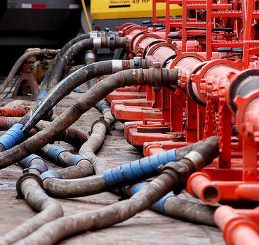Water body without weapons to halt gas wells in WA
 Western Australia's Department of Water says it advises against shale gas fracking underneath public drinking water sources, but has no power to do anything more.
Western Australia's Department of Water says it advises against shale gas fracking underneath public drinking water sources, but has no power to do anything more.
The Water Department revealed its lack of veto powers over shale gas fracking in an inquiry into the dangers of hydraulic fracking – the practice of fracturing of hard rock to release trapped natural gas.
The executive director of policy and innovation at the department, Tad Bagdon, indicated there may be some conflict over protection of water supplies in the path of the expanding gas industry.
He says his department will work with the Environmental Protection Authority “to ensure approval processes have the appropriate level of assessment”.
The Conservation Council of Western Australia wants the inquiry to push for tough regulations to control shale gas fracking.
The council's director, Piers Verstegen, is not impressed by the proposed rules.
“We've looked at the draft regulations pretty closely and what they actually say is they require industry best practice,” he said.
“What we know from other parts of the world is industry best practice means contaminated ground water, serious air pollution, health impacts on communities and serious environmental disturbance, so we don't think industry best practice is going to be acceptable here for Western Australia.”
Inquiry chairman Simon O'Brien says the high amount of submission received for the official probe show the strength of feelings around fracking.
“It's fair to say there's vested interests,” Mr O’Brien said.
“What we want to do is burrow through all of that and work out what is the truth of the matter.”
The Australian Petroleum Production and Exploration Association says it expects about a dozen wells for shale gas fracking will be drilled across Western Australia this year.
A spokesperson for the peak body representing the oil and gas industry says the practice is safe, and problems come from leaking wells not the rock fracturing itself.
“In very rare cases there had been contamination of water but that had been remedied by the regulator and the operator,” the spokesperson said.
APPEA reportedly supports full disclosure of chemicals used in fracking fluid, but also claims disclosure should be limited to protect new products.
Based on well density in the US, there could be up to 100,000 wells in the Kimberly when the industry is in full swing.
Western Australia sits on top of about one fifth of the world's shale gas reserves.
Several cases are before court in the US, where claims over water supply contamination are being tested.








 Print
Print